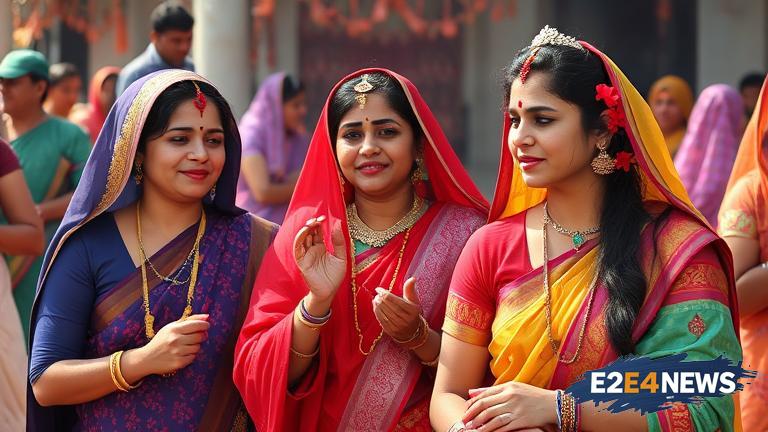The festival of Teej is a significant occasion for Nepali Hindu women, who observe a day of fasting, worship, and celebration. This festival is a time for women to reflect on their lives, seek forgiveness for past mistakes, and pray for a better future. During Teej, women gather at temples and shrines, dressed in their finest attire, to worship Lord Shiva and seek his blessings. The festival is also a time for women to share their experiences, pain, and anxiety with each other, providing a sense of community and support. Many women observe a strict fast, abstaining from food and water, as a sign of devotion and dedication to their faith. Others may choose to eat only certain foods, such as fruits and vegetables, or may break their fast at sunset. The festival is also a time for women to engage in traditional dances, songs, and other cultural activities. In Nepal, Teej is a national holiday, and women are given a day off from work to observe the festival. The festival is also celebrated in other countries, including India and the United States, where Nepali Hindu communities come together to mark the occasion. Despite the challenges and hardships that many Nepali Hindu women face, the festival of Teej provides a sense of hope and empowerment. It is a reminder that women are strong, resilient, and capable of overcoming any obstacle. The festival also highlights the importance of women’s roles in society, including their contributions to family, community, and culture. In recent years, the festival of Teej has become more commercialized, with many businesses and organizations offering special deals and discounts to women. However, for many women, the true spirit of Teej remains unchanged, and it continues to be a deeply personal and meaningful experience. The festival is also a time for women to connect with their heritage and cultural traditions, and to pass these down to younger generations. In addition to its cultural and spiritual significance, the festival of Teej also has a number of health benefits, including improved mental and physical well-being. Many women report feeling a sense of calm and tranquility during the festival, which can help to reduce stress and anxiety. The festival is also a time for women to focus on their own needs and desires, rather than prioritizing the needs of others. This can be a powerful and liberating experience, allowing women to tap into their own strength and potential. Overall, the festival of Teej is a unique and special occasion that celebrates the power and resilience of Nepali Hindu women. It is a time for women to come together, share their experiences, and support each other, and it continues to play an important role in Nepali Hindu culture and tradition. The festival is also a reminder of the importance of women’s empowerment and equality, and it highlights the need for greater support and recognition of women’s contributions to society. As the festival of Teej continues to evolve and grow, it is likely that it will remain an important and meaningful occasion for Nepali Hindu women around the world. The festival’s significance extends beyond Nepal, and it is celebrated by Nepali Hindu communities globally. The festival is a celebration of women’s strength, courage, and resilience, and it serves as a reminder of the importance of women’s roles in society. The festival of Teej is a time for women to reflect on their lives, seek forgiveness, and pray for a better future. It is a time for women to come together, share their experiences, and support each other, and it continues to play an important role in Nepali Hindu culture and tradition.
